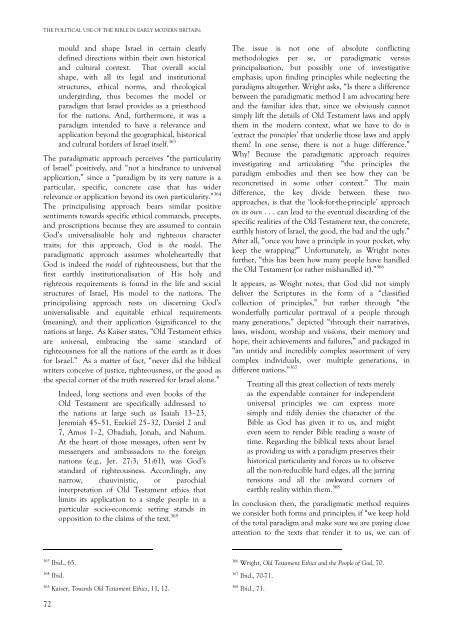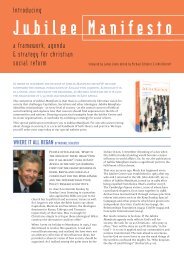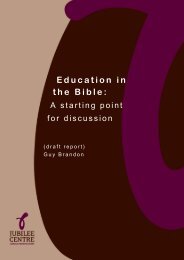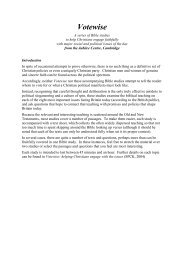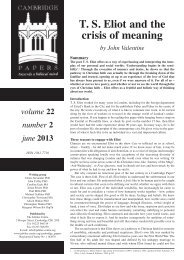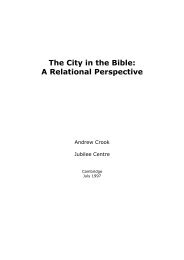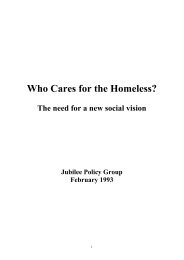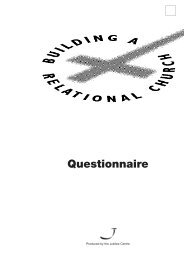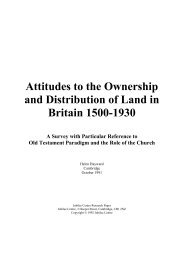Report Template - Jubilee Centre
Report Template - Jubilee Centre
Report Template - Jubilee Centre
You also want an ePaper? Increase the reach of your titles
YUMPU automatically turns print PDFs into web optimized ePapers that Google loves.
THE POLITICAL USE OF THE BIBLE IN EARLY MODERN BRITAIN:<br />
mould and shape Israel in certain clearly<br />
defined directions within their own historical<br />
and cultural context. That overall social<br />
shape, with all its legal and institutional<br />
structures, ethical norms, and theological<br />
undergirding, thus becomes the model or<br />
paradigm that Israel provides as a priesthood<br />
for the nations. And, furthermore, it was a<br />
paradigm intended to have a relevance and<br />
application beyond the geographical, historical<br />
and cultural borders of Israel itself. 363<br />
The paradigmatic approach perceives “the particularity<br />
of Israel” positively, and “not a hindrance to universal<br />
application,” since a “paradigm by its very nature is a<br />
particular, specific, concrete case that has wider<br />
relevance or application beyond its own particularity.” 364<br />
The principalising approach bears similar positive<br />
sentiments towards specific ethical commands, precepts,<br />
and proscriptions because they are assumed to contain<br />
God’s universalisable holy and righteous character<br />
traits; for this approach, God is the model. The<br />
paradigmatic approach assumes wholeheartedly that<br />
God is indeed the model of righteousness, but that the<br />
first earthly institutionalisation of His holy and<br />
righteous requirements is found in the life and social<br />
structures of Israel, His model to the nations. The<br />
principalising approach rests on discerning God’s<br />
universalisable and equitable ethical requirements<br />
(meaning), and their application (significance) to the<br />
nations at large. As Kaiser states, “Old Testament ethics<br />
are universal, embracing the same standard of<br />
righteousness for all the nations of the earth as it does<br />
for Israel.” As a matter of fact, “never did the biblical<br />
writers conceive of justice, righteousness, or the good as<br />
the special corner of the truth reserved for Israel alone.”<br />
Indeed, long sections and even books of the<br />
Old Testament are specifically addressed to<br />
the nations at large such as Isaiah 13–23,<br />
Jeremiah 45–51, Ezekiel 25–32, Daniel 2 and<br />
7, Amos 1–2, Obadiah, Jonah, and Nahum.<br />
At the heart of those messages, often sent by<br />
messengers and ambassadors to the foreign<br />
nations (e.g., Jer. 27:3; 51:61), was God’s<br />
standard of righteousness. Accordingly, any<br />
narrow, chauvinistic, or parochial<br />
interpretation of Old Testament ethics that<br />
limits its application to a single people in a<br />
particular socio-economic setting stands in<br />
opposition to the claims of the text. 365<br />
The issue is not one of absolute conflicting<br />
methodologies per se, or paradigmatic versus<br />
principalisation, but possibly one of investigative<br />
emphasis; upon finding principles while neglecting the<br />
paradigms altogether. Wright asks, “Is there a difference<br />
between the paradigmatic method I am advocating here<br />
and the familiar idea that, since we obviously cannot<br />
simply lift the details of Old Testament laws and apply<br />
them in the modern context, what we have to do is<br />
‘extract the principles’ that underlie those laws and apply<br />
them? In one sense, there is not a huge difference.”<br />
Why? Because the paradigmatic approach requires<br />
investigating and articulating “the principles the<br />
paradigm embodies and then see how they can be<br />
reconcretised in some other context.” The main<br />
difference, the key divide between these two<br />
approaches, is that the ‘look-for-the-principle’ approach<br />
on its own . . . can lead to the eventual discarding of the<br />
specific realities of the Old Testament text, the concrete,<br />
earthly history of Israel, the good, the bad and the ugly.”<br />
After all, “once you have a principle in your pocket, why<br />
keep the wrapping?” Unfortunately, as Wright notes<br />
further, “this has been how many people have handled<br />
the Old Testament (or rather mishandled it).” 366<br />
It appears, as Wright notes, that God did not simply<br />
deliver the Scriptures in the form of a “classified<br />
collection of principles,” but rather through “the<br />
wonderfully particular portrayal of a people through<br />
many generations,” depicted “through their narratives,<br />
laws, wisdom, worship and visions, their memory and<br />
hope, their achievements and failures,” and packaged in<br />
“an untidy and incredibly complex assortment of very<br />
complex individuals, over multiple generations, in<br />
different nations.” 367<br />
Treating all this great collection of texts merely<br />
as the expendable container for independent<br />
universal principles we can express more<br />
simply and tidily denies the character of the<br />
Bible as God has given it to us, and might<br />
even seem to render Bible reading a waste of<br />
time. Regarding the biblical texts about Israel<br />
as providing us with a paradigm preserves their<br />
historical particularity and forces us to observe<br />
all the non-reducible hard edges, all the jarring<br />
tensions and all the awkward corners of<br />
earthly reality within them. 368<br />
In conclusion then, the paradigmatic method requires<br />
we consider both forms and principles; if “we keep hold<br />
of the total paradigm and make sure we are paying close<br />
attention to the texts that render it to us, we can of<br />
363<br />
Ibid., 65.<br />
364<br />
Ibid.<br />
365<br />
Kaiser, Towards Old Testament Ethics, 11, 12.<br />
366<br />
Wright, Old Testament Ethics and the People of God, 70.<br />
367<br />
Ibid., 70-71.<br />
368<br />
Ibid., 71.<br />
72


